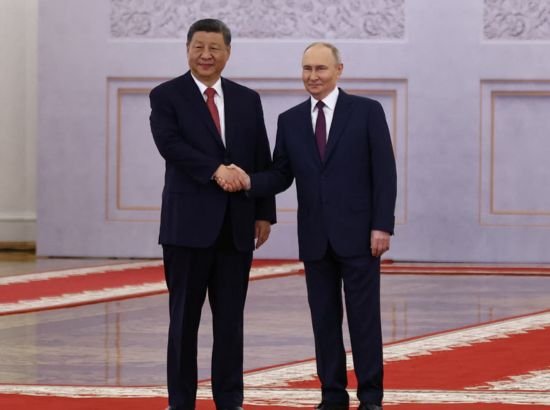
Xi Jinping praises China Russia ties during a grand Moscow visit, declaring deepened cooperation and pushing back against Western influence.
Chinese President Xi Jinping met Russian President Vladimir Putin in Moscow for his 11th state visit. During a welcoming ceremony at the Kremlin, Xi described their partnership as “confident, stable, and resilient.”
Putin referred to Xi as a “dear friend,” while Xi echoed the sentiment by calling him an “old friend.” Both emphasized shared interests in reshaping the global order.
“China is ready to work with Russia to build a multipolar world,” Xi said. He described their relationship as a natural continuation of a historic friendship.
Xi is in Russia for the 80th Victory Day commemorations marking the end of World War II. Celebrated on May 9, the event has drawn global attention, especially as world leaders faced disrupted travel due to Ukrainian drone threats. Several Moscow airports shut down on Wednesday, and Serbian President Aleksandar Vučić’s flight was rerouted.
Xi’s plane, escorted by Russian fighter jets, landed safely. A military band welcomed him with the Chinese and Russian anthems.
Russia declared a three-day ceasefire for the celebrations, which Ukraine said had largely held. As of Thursday morning, no Russian drone or missile strikes were reported over Ukrainian airspace.
During the four-day visit, Xi is expected to sign multiple cooperation agreements with Putin, reinforcing what both nations call a “no limits” partnership.
In a Russian media column published Wednesday, Xi revisited the nations’ shared World War II history. He warned against modern “unilateralism and bullying,” seen as criticism of the U.S.
“We must resolutely oppose all forms of hegemony and power politics,” Xi wrote. On Thursday, he reiterated that the world now faces “hegemonic bullying,” referencing ongoing US-China tensions, including the trade war.
Xi also used the platform to reinforce China’s position on Taiwan. He praised Russia’s adherence to the “One China” policy. “Russia has made clear that Taiwan is an inseparable part of China and supports our national reunification,” Xi said.
This statement came hours after Taiwan’s President Lai Ching-te urged European nations to back Taiwan. Lai warned of a “new totalitarian group,” indirectly referring to China and its allies, and compared Taiwan’s threat to the situation in Europe before WWII.
Western officials fear that China could attempt a military move against Taiwan within a few years. Observers say the war in Ukraine may serve as a test case for such aggression.
Despite past U.S. hopes of driving a wedge between Moscow and Beijing, Xi’s visit and warm words for Putin show a tightening alliance. Economic ties have grown stronger, especially as China continues to serve as a vital lifeline for Russia during the war in Ukraine.
Kyiv has accused Beijing of indirectly supporting Russia’s war efforts. These concerns are growing, especially as Chinese support for Moscow becomes more vocal and visible.
With the world watching, Xi and Putin’s united front sends a clear signal: the China-Russia axis is stronger than ever—at a time when Western alliances remain under strain.